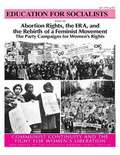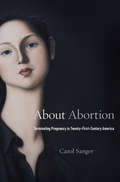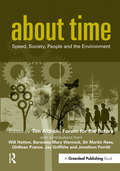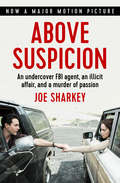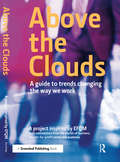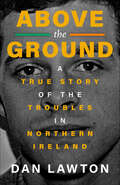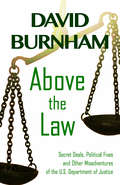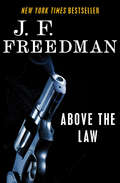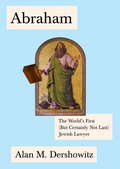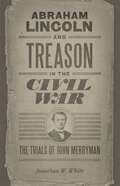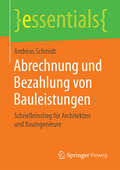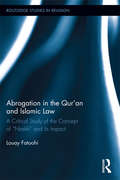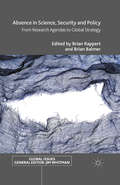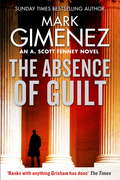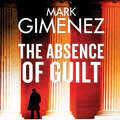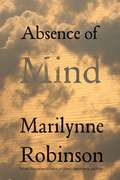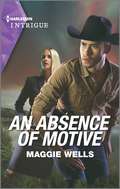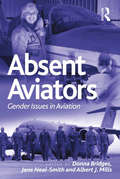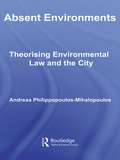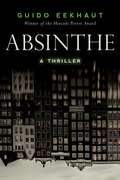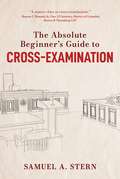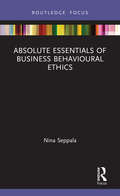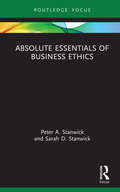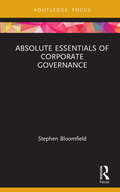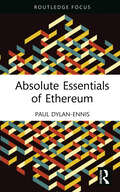- Table View
- List View
Abortion Rights: Documents of the Socialist Workers Party 1971-86
by Mary-Alice WatersPart 3 of a series. How did the oppression of women begin? Who benefits? What social forces have the power to end the second-class status of women? This three-part series helps politically equip the generation of women and men joining battles in defense of women's rights today.
About Abortion: Terminating Pregnancy in Twenty-First Century America
by Carol SangerNew medical technologies, women’s willingness to talk online and off, and tighter judicial reins on state legislatures are shaking up the practice of abortion. As talk becomes more transparent, Carol Sanger writes, women’s decisions about whether to become mothers will be treated more like those of other adults making significant personal choices.
About Time: Speed, Society, People and the Environment
by Martin Rees Will Hutton Mary Warnock Geoff Mulgan Jay Griffiths Jonathon Porritt David Boyle Alexandra Jones Ghillean Prance Tim AldrichWhere does all the time go? Despite the burgeoning army of machines designed to save us time – from cars and aeroplanes to dishwashers and microwaves – we don't seem to have any more of it on our hands. We simply fill the space we clear with more things to do – consuming more, spending more – and then look around for new ways of saving time. And so we spiral onwards, upwards, ever faster. Being busy has become a habit, and a habit that gives us high status – busy people are important people. The business of business is busy-ness. We are moving from a world in which the big eats the small, to a world where the fast eats the slow. But the fallout from a society hooked on speed is everywhere. It's affecting our health: 60 per cent of the adult population in the UK report that they suffer from stress, and more than half of these say that this has worsened over the last 12 months. It's affecting our family life, with a quarter of British families sharing a meal together only once a month. And it affects our environment too: air travel is a major source of carbon dioxide emissions, accelerating climate change as we speed around the world. And the faster we live, the faster we consume, the faster we waste energy and the faster we pollute the planet. The faster we seem to be running out of time. Is there something fundamentally wrong with the structure and values of this high-speed society? What are we running from and what are we running towards? Sustainable development is all about time. It's about trying to safeguard the health of the planet, and the people it supports, indefinitely, unconstrained by time. The idea of time offers a novel perspective on what sustainable development is all about. Looking at issues affecting society and the environment through the prism of time conveys the urgency of the challenge and leads us to solutions we might not have thought of before. About Time, edited by the think-tank Forum for the Future, brings together ten of the world's leading thinkers and writers, including Will Hutton, Baroness Mary Warnock, Sir Martin Rees, Ghillean Prance, Jay Griffiths (the author of the bestselling Pip Pip) and Jonathon Porritt, from disciplines including biology, business, sociology, ethnography, astronomy, philosophy, politics, history and sustainability in a collection of intriguing essays exploring the issue of time and how it relates to the environment, economy and society. The first half of this collection looks at different dimensions of time – from the history of time as a social phenomenon and cultural notions of time, to cosmological time and the difference between human and machine time. These "think-pieces" are followed by a series of more practical, solutions-oriented contributions, looking at how we deal with time in different contexts – from the slow food movement and time banks to long-term thinking in politics and what we can individually do to cope with the speed society. Contributions are liberally interspersed with boxes and brief pieces offering bite-sized facts, figures and insights relating to time and our everyday lives. About Time is a high-profile collection aimed at creating debate about where the values of our contemporary society are taking us. It will foster reflective thinking about different aspects of time, using the concept of time to communicate and illuminate the idea of sustainable development and question our idolatry of speed. In doing so, it aims to inspire and help decision-makers in business, government and elsewhere to appreciate the challenges of sustainable development, and inspire individuals to create change in their own lives. For readers of No Logo and Longitude, this book provides a thought-provoking twist, bringing together time and sustainability in a refreshing, provocative and accessible way.
Above Suspicion: An Undercover FBI Agent, an Illicit Affair, and a Murder of Passion (Above Suspicion Ser. #Vol. 1)
by Joe SharkeyThe &“uncommonly trenchant account of the only known FBI agent to confess to murder&” (Kirkus Reviews). When rookie FBI agent Mark Putnam received his first assignment in 1987, it was the culmination of a lifelong dream, if not the most desirable location. Pikeville, Kentucky, is high in Appalachian coal country, an outpost rife with lawlessness dating back to the Hatfields and McCoys. As a rising star in the bureau, however, Putnam soon was cultivating paid informants and busting drug rings and bank robbers. But when one informant fell in love with him, passion and duty would collide with tragic results. A coal miner&’s daughter, Susan Smith was a young, attractive, struggling single mother. She was also a drug user sometimes described as a con artist, thief, and professional liar. Ultimately, Putnam gave in to Smith&’s relentless pursuit. But when he ended the affair, she waged a campaign of vengeance that threatened to destroy him. When at last she confronted him with a shocking announcement, a violent scuffle ensued, and Putnam, in a burst of uncontrolled rage, fatally strangled her. Though he had everything necessary to get away with murder—a spotless reputation, a victim with multiple enemies, and the protection of the bureau&’s impenetrable shield—his conscience wouldn&’t allow it. Tormented by a year of guilt and deception, Putnam finally led authorities to Smith&’s remains. This is the story of what happened before, during, and after his startling confession—an account that &“should take its place on the dark shelf of the best American true crime&” (Newsday). Revised and updated, this ebook also includes photos and a new epilogue by the author.
Above the Clouds: A Guide to Trends Changing the Way we Work
by EfqmSome of us work to live. Some of us live to work. Some of us, by design or default, don't work at all. Whatever your position, as a stakeholder in today's society, there is no avoiding the complex web that is the world of work. Everyone is affected to some degree by issues such as stress and work-life balance, teleworking, offshoring, stakeholder democracy, globalisation – the list goes on. But, as things continue to change at an ever-faster rate, what can we expect work to look like in the next five, ten, or twenty years? Above the Clouds is the result of a future studies project carried out by the European Foundation for Quality Management (EFQM), a not-for profit foundation that promotes excellence in European business. The project aimed to identify trends that will have an impact on the world of work over the coming decade. Work here is defined in terms of methods, organisation and future challenges. It took two years to create the full picture, which is now available in this book. "Trendspotting" sessions were organised across Europe as a means of gathering ideas on where work was heading in the future. The experience and insights of people from a diverse range of backgrounds were included in the project. Working with raw material from these sessions, researchers investigated each of the trends and their possible ramifications on the world of work. The resulting articles were posted for comment online. People from all around Europe responded and some of these views are quoted in this book. In addition, academics and leading CEOs and executives were asked for their reactions to these trends. Each of the 15 chapters of Above the Clouds analyses a trend in detail and includes perspectives from business, academia and comments from the European public. There are disagreements, but also a surprising amount of convergence on issues such as leadership, outsourcing, global risk, women, age, spirituality, stress and technology. Rather than trying to offer certainty, the book aims to equip people and organisations with the awareness and adaptability they will need to meet tomorrow's challenges to the way we work. It is fascinating reading for anyone interested in how the big issues of work are likely to impact on us all.
Above the Ground: A True Story of the Troubles in Northern Ireland
by Dan LawtonConvicted for a murder that he did not commit, ABOVE THE GROUND: A True Story of the Troubles in Northern Ireland by Dan Lawton takes readers through the chronicle of one of the darkest periods in Northern Ireland's history, highlighting themes of injustice, perseverance, and hope through Kevin's escape and struggle. In this deep and exposing novel, readers are shown for the first time, the true story of the murder of British prison official Albert Miles by Irish Republican Army assassins and the best efforts of former IRA men and the British government to keep hidden the secrets of their dirty war during the Troubles in Northern Ireland. No matter where you stand regarding the bloody conflict in Northern Ireland, known as The Troubles, from 1978, ABOVE THE GROUND will have you turning the pages to keep revealing the truth. Filled with courtroom drama and true crime, you are not want to put this new release down!
Above the Law
by David BurnhamThe U.S. Department of Justice is an institution of vast reach and power over the American people, with little oversight into its internal operations. This book examines the ways that attorneys general, FBI directors, federal prosecutors and other Justice Department officials have often abused their powers to achieve political goals rather than pursuing justice. Its warning remains as relevant in the digital post-9/11 era of the expanded national security state as it was in the days of J. Edgar Hoover.
Above the Law: The Disappearance, Above The Law, And A Killing In The Valley (The Luke Garrison Series #2)
by J. F. FreedmanWhen a federal drug bust goes awry, Luke Garrison must investigate a baffling government cover-up In a remote region of the California hills, Mexican drug lord Reynaldo Juarez has built a fortress, complete with a landing strip long enough for a Boeing 737. He has planned the biggest deal of his long and dangerous career: a $100 million cocaine buy that will make him a legend. With the DEA waiting in the hills, the Feds storm the Juarez compound. Four agents end up dead and the drug lord is shot through the skull. In the aftermath of the disastrous raid, former Santa Barbara District Attorney Luke Garrison is tasked with finding the shooter who killed Reynaldo. He will discover that a strange conspiracy, replete with a sinister cover-up, lies behind the assault on the kingpin&’s compound. Going up against the DEA is a fearsome prospect, but fearlessness is all that Luke has left.
Abraham
by Alan M. DershowitzPart of the Jewish Encounter seriesOne of the world's best-known attorneys gives us a no-holds-barred history of Jewish lawyers: from the biblical Abraham through modern-day advocates who have changed the world by challenging the status quo, defending the unpopular, contributing to the rule of law, and following the biblical command to pursue justice. The Hebrew Bible's two great examples of advocacy on behalf of problematic defendants--Abraham trying to convince God not to destroy the people of Sodom, and Moses trying to convince God not to destroy the golden-calf-worshipping Children of Israel--established the template for Jewish lawyers for the next 4,500 years. Whether because throughout history Jews have found themselves unjustly accused of crimes ranging from deicide to ritual child murder to treason, or because the biblical exhortation that "justice, justice, shall you pursue" has been implanted in the Jewish psyche, Jewish lawyers have been at the forefront in battles against tyranny, in advocating for those denied due process, in negotiating for just and equitable solutions to complex legal problems, and in efforts to ensure a fair trial for anyone accused of a crime. Dershowitz profiles Jewish lawyers well-known and unheralded, admired and excoriated, victorious and defeated--and, of course, gives us some glimpses into the gung-ho practice of law, Dershowitz-style. Louis Brandeis, Theodor Herzl, Judah Benjamin, Max Hirschberg, René Cassin, Bruno Kreisky, Ruth Bader Ginsburg, and Irwin Cotler are just a few of the "idol smashers, advocates, collaborators, rescuers, and deal makers" who helped to change history. Dershowitz's thoughts on the future of the Jewish lawyer are presented with the same insight, shrewdness, and candor that are the hallmarks of his more than four decades of writings on the law and how it is (and should be!) practiced.From the Hardcover edition. his writings on the law and how it is (and should be!) practiced.
Abraham Lincoln and Treason in the Civil War: The Trials of John Merryman (Conflicting Worlds: New Dimensions of the American Civil War)
by Jonathan W. WhiteIn the spring of 1861, Union military authorities arrested Maryland farmer John Merryman on charges of treason against the United States for burning railroad bridges around Baltimore in an effort to prevent northern soldiers from reaching the capital. From his prison cell at Fort McHenry, Merryman petitioned Chief Justice of the Supreme Court Roger B. Taney for release through a writ of habeas corpus. Taney issued the writ, but President Abraham Lincoln ignored it. In mid-July Merryman was released, only to be indicted for treason in a Baltimore federal court. His case, however, never went to trial and federal prosecutors finally dismissed it in 1867.In Abraham Lincoln and Treason in the Civil War, Jonathan White reveals how the arrest and prosecution of this little-known Baltimore farmer had a lasting impact on the Lincoln administration and Congress as they struggled to develop policies to deal with both northern traitors and southern rebels. His work exposes several perennially controversial legal and constitutional issues in American history, including the nature and extent of presidential war powers, the development of national policies for dealing with disloyalty and treason, and the protection of civil liberties in wartime.
Abrechnung und Bezahlung von Bauleistungen: Schnelleinstieg für Architekten und Bauingenieure (essentials)
by Andreas SchmidtAndreas Schmidt gibt praktische Hilfestellung f#65533;r die zeitnahe Realisierung und Absicherung von Verg#65533;tungsanspr#65533;chen. Dies ist f#65533;r Bauunternehmen eine wesentliche Voraussetzung f#65533;r den Unternehmenserfolg, denn diese sind nach der gesetzlichen Konzeption des Werkvertragsrechts grunds#65533;tzlich vorleistungspflichtig - d. h. sie m#65533;ssen das f#65533;r die Leistungserbringung erforderliche Personal, Material und Ger#65533;t zun#65533;chst vorfinanzieren. Der Autor zeigt, wie der Bauunternehmer die Regelungen im BGB und in der VOB/B betreffend die Abrechnung seiner Leistung sachgem#65533;#65533; anwendet, um Zahlungsfl#65533;sse zu beschleunigen. Zudem erf#65533;hrt der Unternehmer, wie er reagieren kann, wenn der Auftraggeber versp#65533;tet oder gar nicht zahlt und wie er seinen Verg#65533;tungsanspruch f#65533;r den Insolvenzfall absichern kann.
Abrogation in the Qur'an and Islamic Law (Routledge Studies in Religion #22)
by Louay FatoohiThis book examines in detail the concept of "abrogation" in the Qur’an, which has played a major role in the development of Islamic law and has implications for understanding the history and integrity of the Qur’anic text. The term has gained popularity in recent years, as Muslim groups and individuals claim that many passages about tolerance in the Qur’an have been abrogated by others that call on Muslims to fight their enemies. Author Louay Fatoohi argues that this could not have been derived from the Qur’an, and that its implications contradict Qur’anic principles. He also reveals conceptual flaws in the principle of abrogation as well as serious problems with the way it was applied by different scholars. Abrogation in the Qur’an and Islamic Law traces the development of the concept from its most basic form to the complex and multi-faceted doctrine it has become. The book shows what specific problems the three modes of abrogation were introduced to solve, and how this concept has shaped Islamic law. The book also critiques the role of abrogation in rationalizing the view that not all of the Qur’anic revelation has survived in the "mushaf", or the written record of the Qur’an. This role makes understanding abrogation an essential prerequisite for studying the history of the Qur’anic text.
Absence in Science, Security and Policy: From Research Agendas to Global Strategy (Global Issues)
by Brian Balmer Brian RappertThis book explores the absent and missing in debates about science and security. Through varied case studies, including biological and chemical weapons control, science journalism, nanotechnology research and neuroethics, the contributors explore how matters become absent, ignored or forgotten and the implications for ethics, policy and society.The chapter 'Sensing Absence: How to See What Isn't There in the Study of Science and Security' is open access under a CC BY 4.0 license via link.springer.com.
The Absence of Guilt (A. Scott Fenney)
by Mark GimenezMark Gimenez, author the massive international bestseller The Colour of Law, is back, as superstar lawyer Scott A. Fenney takes the stand for an impossible case. An ISIS attack on America is narrowly averted when the FBI uncovers a plot to detonate a weapon of mass destruction in Dallas, Texas during the Super Bowl.A federal grand jury indicts twenty-four co-conspirators, including Omar al Mustafa, a notorious and charismatic Muslim cleric known for his incendiary anti-American diatribes on YouTube and Fox News. His arrest is greeted with cheers around the world and relief at home. The President goes on national television and proclaims: 'We won!'There is only one problem: there is no evidence against Mustafa. That problem falls to the presiding judge, newly appointed U.S. District Judge A. Scott Fenney.If Mustafa is innocent, Scott must set the most dangerous man in Dallas free, with no idea who is really guilty.And with just three weeks before the attack is due . . .
The Absence of Guilt (A. Scott Fenney)
by Mark GimenezMark Gimenez, author the massive international bestseller The Colour of Law, is back as superstar lawyer Scott A. Fenney takes the stand for an impossible case.An ISIS attack on America is narrowly averted when the FBI uncovers a plot to detonate a weapon of mass destruction in Dallas, Texas during the Super Bowl.A federal grand jury indicts twenty-four co-conspirators, including Omar al Mustafa, a notorious and charismatic Muslim cleric known for his incendiary anti-American diatribes on YouTube and Fox News. His arrest is greeted with cheers around the world and relief at home. The President goes on national television and proclaims: 'We won!'There is only one problem: there is no evidence against Mustafa. That problem falls to the presiding judge, newly appointed U.S. District Judge A. Scott Fenney.If Mustafa is innocent, Scott must set the most dangerous man in Dallas free, with no idea who is really guilty.And all with just three weeks to go before the attack is due . . .
Absence of Mind: The Dispelling of Inwardness from the Modern Myth of the Self
by Marilynne RobinsonIn this ambitious book, acclaimed writer Marilynne Robinson applies her astute intellect to some of the most vexing topics in the history of human thought--science, religion, and consciousness. Crafted with the same care and insight as her award-winning novels, Absence of Mind challenges postmodern atheists who crusade against religion under the banner of science. In Robinson's view, scientific reasoning does not denote a sense of logical infallibility, as thinkers like Richard Dawkins might suggest. Instead, in its purest form, science represents a search for answers. It engages the problem of knowledge, an aspect of the mystery of consciousness, rather than providing a simple and final model of reality. By defending the importance of individual reflection, Robinson celebrates the power and variety of human consciousness in the tradition of William James. She explores the nature of subjectivity and considers the culture in which Sigmund Freud was situated and its influence on his model of self and civilization. Through keen interpretations of language, emotion, science, and poetry, Absence of Mind restores human consciousness to its central place in the religion-science debate.
An Absence of Motive (A Raising the Bar Brief #1)
by Maggie WellsHe was an outsiderAnd the only man she could trust. Attorney Marlee Masters&’s brother was murdered. Proving it means working with Sheriff Ben Kinsella and facing down the nasty whispers in their rural Georgia town. Although the gossips accuse Marlee of being the real threat, there's a stalker vowing retribution if the two don&’t end the investigation. Ben won&’t abandon Marlee in her hour of need, but will she have to place herself in even more peril to catch the killer? From Harlequin Intrigue: Seek thrills. Solve crimes. Justice served. Discover more action-packed stories in the Raising the Bar Brief series. All books are stand-alone with uplifting endings but were published in the following order: Book 1: An Absence of MotiveBook 2: For the DefenseBook 3: Trial in the Backwoods
Absent Aviators: Gender Issues in Aviation
by Donna BridgesThe objective of this book is to present a number of related chapters on the subject of gender issues in the workplace of the aviation industry. More specifically, the chapters address the continuing shortfall in the number of women pilots in both civilian and military aviation. Considerable research has been carried out on gender issues in the workplace and, for example, women represent about 10% of employees in engineering. This example is often used to show that the consequences of gender discrimination are embedded and difficult to overcome in masculine-dominated occupations. However, women represent only 5-6% of the profession of pilot. Clearly there are many factors which mitigate women seeking to become pilots. The chapters within this volume raise both theoretical and practical issues, endeavouring to address the imbalance of women pilots in this occupation. Absent Aviators consolidates a diverse range of issues from a number of authors from Australia, Austria, the United States, Canada, South Africa and the United Kingdom. Each of the chapters is research-based and aims to present a broad picture of gender issues in aviation, gendered workplaces and sociology, underpinned by sound theoretical perspectives and methodologies. One chapter additionally raises issues on the historical exclusion of race from an airline. The book will prove to be a valuable contribution to the debates on women in masculine-oriented occupations and a practical guide for the aviation industry to help overcome the looming shortfall of pilots. It is also hoped it will directly encourage young women to identify and overcome the barriers to becoming a civilian or military pilot.
Absent Environments: Theorising Environmental Law and the City (Law, Science and Society)
by Andreas Philippopoulos-MihalopoulosOffering a novel, transdisciplinary approach to environmental law, its principles, mechanics and context, as tested in its application to the urban environment, this book traces the conceptual and material absence of communication between the human and the natural and controversially includes such an absence within a system of law and a system of geography which effectively remain closed to environmental considerations. The book looks at Niklas Luhmann's theory of autopoiesis. Introducing the key concepts and operations, contextualizing them and opening them up to critical analysis. Indeed, in contrast to most discussions on autopoiesis, it proposes a radically different reading of the theory, in line with critical legal, political, sociological, urban and ecological theories, while drawing from writings by Husserl and Derrida, as well as Latour, Blanchot, Haraway, Agamben and Nancy. It explores a range of topics in the areas of environmental law and urban geography, including: environmental risk, environmental rights, the precautionary principle, intergenerational equity and urban waste discourses on community, nature, science and identity. The author redefines the traditional foundations of environmental law and urban geography and suggests a radical way of dealing with scientific ignorance, cultural differences and environmental degradation within the perceived need for legal delivery of certainty.
Absinthe: A Thriller
by Guido EekhautWalter Eekhaut (his name rhymes with "stakeout"), a veteran of the Belgian police force who has a problem with authority, is dispatched to Amsterdam to aid the Dutch security service in investigating the activities of a well-connected Russian oligarch, with connections to Putin. Some of the Russian's business is certainly legitimate, but some may well not be. In Amsterdam, Eekhaut is seconded to Chief Superintendent Alexandra Dewaal and her team, and begins to learn about the city's shady underside. He is at once pulled into another case, the murder of a young leftist dissident, alleged to have stolen a sensitive list from the Amsterdam offices of an ultra-right-wing political party-a list with the name of secret donors. The hunt for the killer leads to a knot of black money interests and illegal dealings that pit the Russian mob and Dutch politicians and business leaders against the police and anyone else who tries to get in their way. Absinthe is the gripping first installment in the bestselling Amsterdam trilogy featuring Eekhaut and Dewaal and, for North American readers, a new voice in European noir.
The Absolute Beginner's Guide to Cross-Examination
by Samuel A. SternWritten by an experienced trial lawyer, this book will help you understand the art of cross-examination. Not only will it prepare you for the courtroom, but it will also help you become a successful lawyer.One of the most well-known courtroom situations, the cross-examination is the formal interrogation of a witness called by the other party in a court of law to challenge or extend testimony already given. It is the prosecutor or defense attorney's opportunity to strengthen his or her own case by questioning the opposite side's witness. To do so with expertise, calm, and finesse is a hard-learned but invaluable skill.In The Absolute Beginners Guide to Cross-Examination, trial lawyer and teacher Samuel A. Stern demonstrates that conducting an effective cross-examination is a learned skill and that his comprehensive teachings are its foundation. This contemporary and clear guide is designed so that you can quickly and effectively cross-examine.Learn how to successfully cross-examine a witness in this easy-to-read, step-by-step guide. This book will be a integral addition to the shelf of every law student, lawyers who have newly passed the bar exam, law professors, and even seasoned practicing lawyers. Cross-examination is an art, and Stern teaches you the finest aspects of it in The Absolute Beginners Guide to Cross-Examination.
Absolute Essentials of Business Behavioural Ethics (Absolute Essentials of Business and Economics)
by Nina SeppalaBehavioural ethics in business is an emerging field that has challenged some of the established wisdom about ethics and added some truly new insights into our understanding about decision-making and behaviour. Why do seemingly responsible employees and managers sometimes act in bad ways? This book explains how people behave in real situations and what action can be taken to nudge behaviour in a more ethical direction. This concise textbook is ideal for use in the classroom as core or additional reading on courses in business ethics and corporate social responsibility; organisational behaviour and psychology; and any module with ethics content (for example, accounting ethics and strategic management). Each chapter is presented as a story with details about the experimental designs and related research findings. The key features include learning outcomes, suggested class activities, mock assessment questions, and an annotated list of key readings and these provide a one-stop text for tutors and students interested in this increasingly important area of study.
Absolute Essentials of Business Ethics (Absolute Essentials of Business and Economics)
by Peter Stanwick Sarah StanwickThis shortform textbook explores practical applications of how business ethics impacts working lives, allowing readers to reflect on their own moral compass through the use of ethical dilemmas. Highlighting the extensive breadth of issues related to business ethics, the authors introduce and analyze ethical and unethical behaviors of firms through numerous real -life examples including Patagonia, Costco, LVMH, Bill Gates, Muhummad Yunus, Enron, WorldCom, Samsung, Purdue Pharma, Vale Mining and the COVID-19 crisis. Regardless of career path or occupation, Absolute Essentials of Business Ethics is a valuable resource to understand why people make decisions based on their own ethical values and beliefs. Useful at both undergraduate and graduate levels, this unique textbook will serve students of business ethics around the world.
Absolute Essentials of Corporate Governance (Absolute Essentials of Business and Economics)
by Stephen BloomfieldThis shortform textbook, a concise overview of the development and current state of corporate governance, provides a critical narrative on the field.Beginning with insightful historical background, the author shows how value-adding corporate governance involves more than unthinking compliance to a recitation of statutes, regulations and principles, devoid of context. Features include basic definitions, reviews of theoretical governance problems, and a worldwide review of current governance provisions along with more detail on the UK situation. Revealing the geology of governance in the business world, the book highlights its progress set into a framework of regulation and law.This textbook provides a brief, authoritative summary of the field for two core audiences: as a reference for specialist readers, and as an concise introduction for non-specialist readers.
Absolute Essentials of Ethereum (Absolute Essentials of Business and Economics)
by Paul Dylan-EnnisAbsolute Essentials of Ethereum is a concise textbook which guides the reader through the fascinating world of the emerging Ethereum ecosystem, from the basics of how its blockchain works to cutting-edge applications.Written by an experienced educator, each chapter is designed to progress potential students from class to class. Technical concepts are clearly explained for those new to the topic and readers are supported with definitions and summaries in each chapter. Real-life case studies situate the overviews in a contemporary context. Topics covered include the Ethereum Execution and Consensus layers, Ethereum governance and community, Decentralised Autonomous Organisations (DAOs), Decentralised Finance (DeFi), Non-Fungible Tokens (NFTs) and Layer 2.This book is the ideal text to support undergraduate and postgraduate courses on blockchain technologies, cryptocurrencies, Web3 and fintech, as well as for those who want to know how Ethereum really works.
